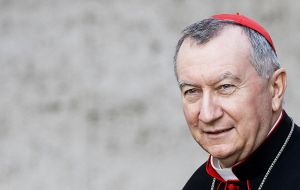MercoPress. South Atlantic News Agency
Pope declines request to help select judges for Colombia's peace tribunal
 Francis “reiterates his support for the goal of attaining the peace and reconciliation of the entire Colombian people, in light of human rights and Christian values”
Francis “reiterates his support for the goal of attaining the peace and reconciliation of the entire Colombian people, in light of human rights and Christian values”  Cardinal Pietro Parolin said Francis received the invitation to appoint a representative to select judges for a Special Jurisdiction for Peace
Cardinal Pietro Parolin said Francis received the invitation to appoint a representative to select judges for a Special Jurisdiction for Peace  The Colombian Catholic Church is cautious: Tunja Archbishop Luis Augusto Castro was explicit, “It’s one thing to stop war … it’s quite another to build peace.”
The Colombian Catholic Church is cautious: Tunja Archbishop Luis Augusto Castro was explicit, “It’s one thing to stop war … it’s quite another to build peace.” The Vatican announced Wednesday that, although Pope Francis is pleased about a peace deal between the government of Colombia and the country’s guerrillas, he has declined a request to have a Vatican envoy help select judges for a new peace tribunal.
The pontiff pledged his support for the deal reached between the government of President Juan Manuel Santos and the Revolutionary Armed Forces of Colombia (FARC), which could mean the end to a six-decade long civil war, considered one of the world longest-running conflicts.
In a statement released on Wednesday, the Vatican says Francis “reiterates his support for the goal of attaining the peace and reconciliation of the entire Colombian people, in light of human rights and Christian values, which are at the heart of Latin American culture.”
Yet, the Vatican says, the job of selecting the judges for a proposed truth and justice commission is best left to others.
According to the statement, signed by the Vatican’s Secretariat of State, headed by Italian Cardinal Pietro Parolin, Francis received the invitation to appoint a representative to participate in the committee that will select the judges who will comprise a Special Jurisdiction for Peace on August 12.
However, the statement says, “bearing in mind the universal vocation of the Church and the mission of the Successor of Peter as Pastor of the People of God, it would be more appropriate that the said task be entrusted to other parties.”
The announcement came only days after the Marxist-narcotics FARC rebels in Colombia put a permanent ceasefire into effect, on Aug. 28. The armistice, product of long negotiations through which the local Catholic hierarchy played a key role, came after 52 years.
Signed last June, the ceasefire marks an ostensible end to all hostilities. As part of the agreement, certain elements of FARC leadership will be officially incorporated into the Colombian government, with former guerrilla leaders being promised 10 seats in Congress and their own political party.
In exchange, FARC leaders have agreed to disarm and leave aside the kidnapping, extortion and drug trafficking that historically fund their cause.
However many people in Colombia, including former victims of FARC violence, have criticized the generous terms of the deal.
The ceasefire signed on June 23 was four years in the making, and it represent an agreement on what the parties describe as “five pillars:” The demobilization of the guerillas, political participation, rural development, the illicit economy, and victims of the violence.
The conflict has claimed an estimated 220,000 lives and displaced nearly 7 million people from their homes. Yet as per the deal, any rebel or government soldier who confesses to or is found guilty of a war crime will face a period of “restricted movement” but not jail.
Among the victims, there are 2 Catholic bishops, 85 priests, eight religious men and women and two seminarians, all killed since 1984. For years, Colombia was considered the world’s most dangerous country to be a priest.
The Catholic Church in Colombia has played a key role in rebuilding trust between the former enemies, yet when the peace deal was announced, it was greeted with caution. As Archbishop Luis Augusto Castro, of Tunja, put it at the time, “It’s one thing to stop war … it’s quite another to build peace.”
Francis too, has been a key player in the peace accord, despite Wednesday’s announcement of the Vatican seating the new commission out.
History’s first Latin American pope publicly pushed for a peace agreement in the country in several opportunities, including during his visit to Cuba and the United States last September, when he said “We do not have the right to allow ourselves yet another failure.”
Francis also often dangled the possibility of a papal visit if the government could come to an agreement with the country’s rebel group, and said trip could in fact come as soon as 2017. Even the United States partially credited the pontiff for the peace process.
In a statement released Sept. 23, 2015, US Secretary of State John Kerry expressed his “deep appreciation to Pope Francis for his moral leadership and the Vatican’s good offices in the quest for peace in Colombia.”




Top Comments
Disclaimer & comment rules-

Read all commentsWhy should The Dope of an Argy Pope risk getting it wrong? His track record so far on getting things right is nothing short of lamentable.
Sep 01st, 2016 - 12:07 pm 0He should put his own house in order and fulfill his pledge to the victims of The Buggering and Raping Brigade of 'The Fathers' of the RCC which he has STILL to do.
Commenting for this story is now closed.
If you have a Facebook account, become a fan and comment on our Facebook Page!